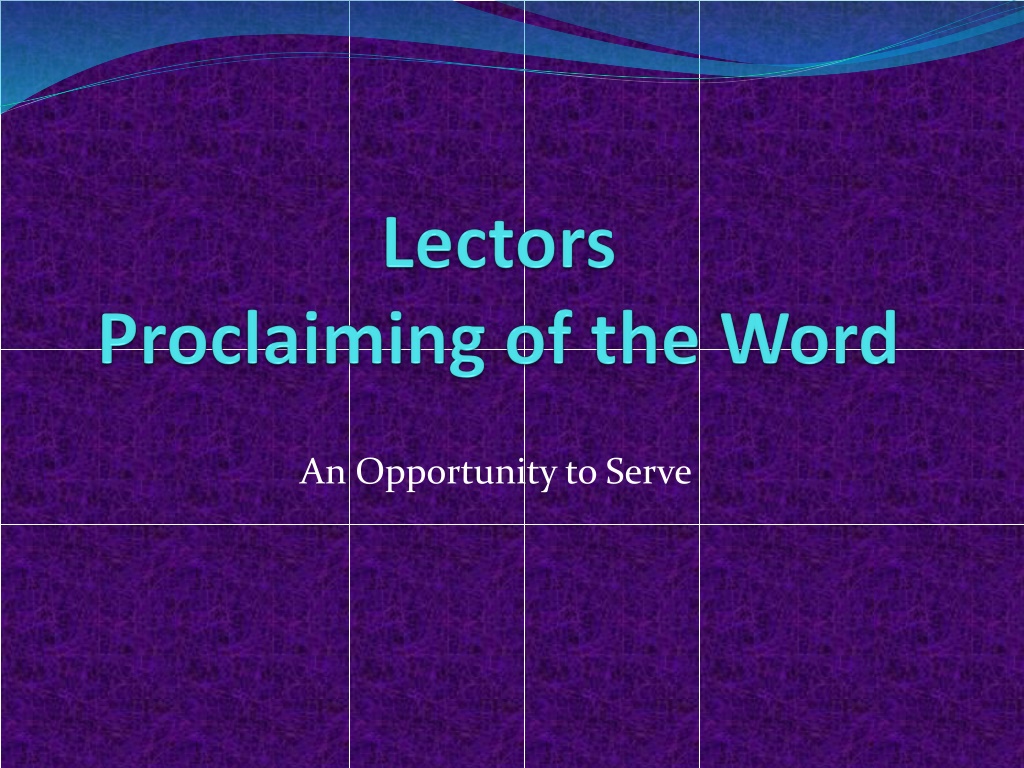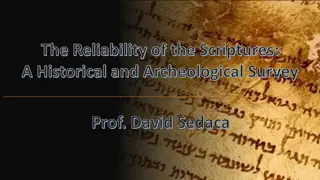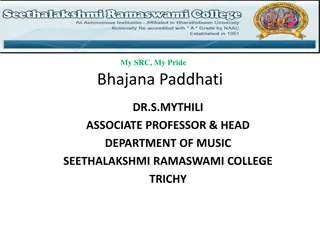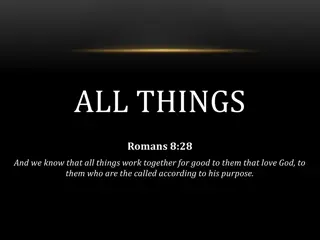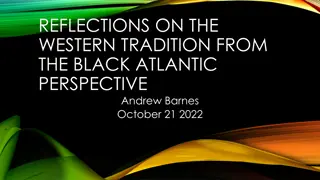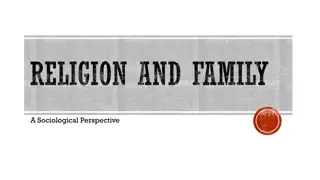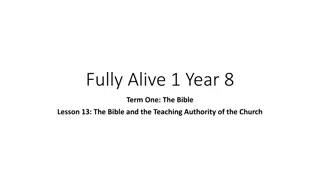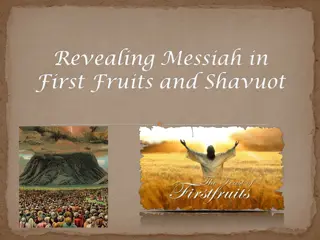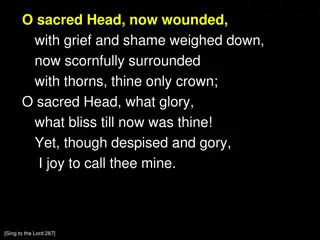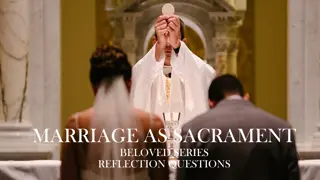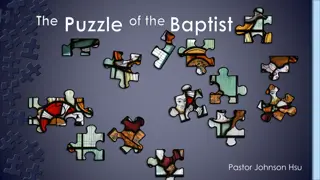Reflections on Sacred Scriptures and Tradition
Delve into the significance of Sacred Scriptures and Tradition in the context of faith and the Church. Explore the teachings of St. Jerome, Thomas Aquinas, and the distinctions between Big T and little t traditions. Gain insights into the role of lectors and the importance of properly proclaiming the Word. Discover how Divine Revelation informs our understanding of God's love and our journey of faith.
Download Presentation

Please find below an Image/Link to download the presentation.
The content on the website is provided AS IS for your information and personal use only. It may not be sold, licensed, or shared on other websites without obtaining consent from the author.If you encounter any issues during the download, it is possible that the publisher has removed the file from their server.
You are allowed to download the files provided on this website for personal or commercial use, subject to the condition that they are used lawfully. All files are the property of their respective owners.
The content on the website is provided AS IS for your information and personal use only. It may not be sold, licensed, or shared on other websites without obtaining consent from the author.
E N D
Presentation Transcript
Plan for the Day Introduction and Overview (accomplished in Church) followed by Exposition Time for some Prayer and Meditation Reviewing the Norms for Extraordinary Ministers of Holy Communion (Lector s will be in Adoration) Reviewing procedures for Lectors (Extraordinary Ministers will be in Adoration) Close with Benediction
The Joy of the Gospel Evangelii Gaudium Pope Francis opens Apostolic Exhortation on the Joy of the Gospel with the following statement 1. The joy of the gospel fills the hearts and lives of all who encounter Jesus. Those who accept his offer of salvation are set free from sin, sorrow, inner emptiness and loneliness. With Christ joy is constantly born anew. The beauty and structure and order of the Church is amazing, but if it does not lead others to personally encounter Christ, she fails in her mission.
Norms for Lectors On the Diocesan Web Site www.diocesefwsb.org you can find the Norms for Lectors. We have copies for you today.
Considerations for Lectors Divine Revelation is God s gift to us, it informs of His love for us and how He invites us to live. It is comprised of Sacred Scripture and Sacred Tradition Sacred Scripture is the Word of God, the Sacred Scriptures are extremely important in our faith. We believe that they are without error in all that relates to what is necessary for salvation. Sacred Tradition The Sacred Scriptures served as the basis for much reflection in the early Church. I doubt if Paul when referring to scripture was referring to his own letters, but his letters came to be revered as such.
Sacred Scripture St. Jerome said, Ignorance of Scripture is ignorance of Christ. Circa 400 AD Thomas Aquinas said that the Sacred Scriptures are the soul of our Sacred Theology. Circa 1100 AD Proclaiming the word is extremely important and should always be done properly so as those hearing the Word, may be moved by it. St. Paul notes in 2 Thes 2:15 Therefore, brothers, stand firm and hold fast to the traditions that you were taught, either by an oral statement or by a letter of ours.
Sacred Tradition Big T and little t Big T This would be those dogmas that are considered to be ir- reformable and held consistently from the earliest epochs of Christianity The Real Presence of the Eucharist The Seven Sacraments The basic structure of the Church based on apostolic succession Little t These would be practices that are open to reform The language of the liturgy Certain liturgical practices
According to Diocesan norms, Who can be a Lector? 1. Man, woman or young person. 2. A person in full communion with the Catholic Church. 3. A person serious about the practice of their faith. 4. A person who is willing to complete a parish or diocesan formation process.
What is required for formation? All new candidates for lector must receive training, either from their pastor or his delegate, or through the Diocesan Office of Worship. No person, no matter how well educated or trained, may be excused from formation for the ministry of lector.
The instruction must include the following: 1. 2. Preparing the Scriptures prayerfully. 3. Instruction in Liturgy of the Word. 4. Proclaiming the Word: practicum and formation in public speaking. Scriptural Spirituality for Ministers of the Word.
Proper Dress Ordained ministers such as the celebrant and deacons are required by liturgical prescription to wear certain vestments. Although a specific form of vesture is not required for lectors, the dignity of the Sacred Liturgy requires that those accepting the call to such ministry dress in a manner reflecting the profound nature of the Preparation
Preparation Ahead of Time Use Sacred Scripture often as a source of your private prayer and meditation outside of your assigned times. When you have been assigned to PROCLAIM the Word to the assembly, prepare, read aloud a nd PRAY the readings during the preceding weeks. Consider how your assigned reading relates to the Gospel and the homily. The Lector Workbooks which are available will be helpful for this preparation.
On the Assigned Day Arrive ahead of time on the day you are schedules so that you can enter into a spirit of prayer before the liturgy begins. Make certain well ahead of time that the Lectionary is correctly marked and that the microphone is adjusted properly. After the liturgy, do a mini self-evaluation by asking: did I PROCLAIM the meaning of the Scriptures, or merely read the words? Did I effectively communicate the assembly God s word of salvation using all the skills available to me? What can I do to improve the next time? .
Notes from the Lectionary 1. The readings are always to be proclaimed at the ambo (#16). The ambo may only be used for the readings, the responsorial psalm, the Easter Proclamation (Exsultet), the homily, and the prayer of the faithful. It may not be used for announcements or for song-leading. 2. because of the dignity of the word of God, the books of readings used in the celebration are not be replaced by other pastoral aids, for example, by leaflets printed for the preparation of the readings by the faithful, or for their personal meditation. (#37) In other words, never proclaim the Word of God from a piece of paper, missaletteor anything other than the Lectionary. 3. You may never change the words of a reading, or proclaim a non-scriptural text during Mass. (#57 GIRM) 4. Whenever there is more than one reading, it is better to assign the readings to different readers, if available. (#52) 5. The Book of the Gospels is carried by the deacon or reader (lector) as part of the Entrance Procession. It is not carried out in procession. The Lectionary is no longer carried in procession. 6. Readers should participate fully in the singing and the prayers at Mass as members of the assembly. They come forward to the ambo at the appropriate time to proclaim the Word and return to the assembly after completing their ministry.
Practical Considerations See the Handout One of the lectors carries the Book of the Gospels if there is no deacon, they should immediately follow the servers. As they approach the altar, a simple bow of the head is made, then they place the book immediately near the center of the altar on either side of the Altar Cross, then they return the pew. (They do not wait for the priest to arrive, they clear the sanctuary as expeditiously as possible. After the second reading the Lectionary is removed from its place to make room for the Book of the Gospels if it was carried in, if not leave the Lectionary in place. (At the 7 am Mass leave it in place so the priest can read the chant antiphon for the alleluia verse, since there is no music) We are not to process out with the book of the Gospels in a normal situation.
Conclusion From Sacrosanctum Concilium, n. 7 To accomplish so great a work, Christ is always present in His Church, especially in her liturgical celebrations. He is present in the sacrifice of the Mass, not only in the person of His minister, "the same now offering, through the ministry of priests, who formerly offered himself on the cross" [20], but especially under the Eucharistic species. By His power He is present in the sacraments, so that when a man baptizes it is really Christ Himself who baptizes [21]. He is present in His word, since it is He Himself who speaks when the holy scriptures are read in the Church. He is present, lastly, when the Church prays and sings, for He promised: "Where two or three are gathered together in my name, there am I in the midst of them" (Matt. 18:20) .
